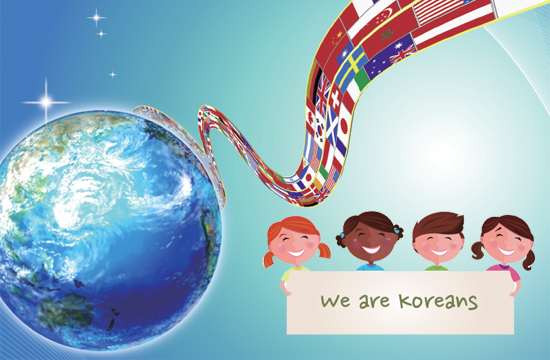
“By looking at Lee Jasmine’s entry to the National Assembly, it is obvious that there will be an increase in the inflow of illegal immigrants and purchasing marriages.”
This is one of the insults that were posted on Twitter against Lee Jasmine, an elected candidate of the Saenuri Party proportional representation in the 19th General Election. On top of this insult, other personal attacks have been posted about her, simply because she is from the Philippines.
In the year 2012, in consideration for the weak and the vulnerable, the Saenuri Party nominated candidate Lee Jasmine. Through the 19th General Election, she became the first member of the National Assembly among immigrants. She met her Korean husband in her home country, came to Korea, got married here and was soon naturalized as a Korean citizen. She tragically lost her husband in an accident. Even after this misfortune, she became the head of the household and strived to help other multicultural families. However, after she was elected, baseless rumors and personal attacks were relentlessly posted on Twitter and other Social Network Service (SNS.) “Why is she interfering with Korean politics? She is not even our citizen.” “Her entry to the National Assembly will reveal the reality of multiculturalism which extorts money from Korea.” “Go do politics in the Philippines.”
These are not criticisms against her stances or qualifications in politics, but just racial discrimination. Currently in Korea, the number of Koreans marrying foreigners and forming multicultural families is increasing every year. According to the law, members of multicultural families are accepted as Korean citizens, but Korean people tend not to accept them as citizens of Korea. Amy Chua, a professor at Yale University, after doing research on the factors that lead to success of empires in history, concluded that pluralistic and tolerant attitudes were the factors of success. Therefore, according to Chua, in order to become a powerful nation, cultural tolerance is needed more than anything. There are always conflicts between people. It can be said that tolerance is a way to resolve this problem peacefully. Tolerance comes from accepting the existence of someone who is different from oneself.
Thus, tolerance is a necessary virtue in relationships among different races, countries, groups and individuals. Members of the multicultural families may have cultural traditions different from other Korean families; but they are all Koreans, so they are also a part of our Korean society. Following Amy Chua’s theory, if we successfully practice cultural tolerance into our society, we will be able to take a step closer to become a powerful nation. Therefore, in this edition of the Cover Story, we will talk about the problems that multicultural families face in Korea and the ways to solve these matters.
Multicultural Families
Multicultural families are composed of diverse cultures. It is the general term for families that have members from different cultural backgrounds. Commonly, in Korea, multicultural families are classified into international marriage families (a Korean man with an immigrant woman, or a Korean woman with an immigrant man,) immigrant families (immigrant workers, North Korean escapees) and so on.
According to the National Statistical Office (NSO,) there were 24,776 international marriages in 2003 and 42,356 in 2005, which was the highest number on record. After that, the yearly number of international marriages maintained a figure around 30,000. In 2010, the number of international marriages increased to 34,235 which were 10.5 percent of all domestic marriages in Korea (326,104.) According to the Ministry of Public Administration and Security, the number of children from multicultural families was 44,258 in 2007, 58,007 in 2008 and sharply increased to 107,689 in 2009. In 2011, the number reached 151,154.
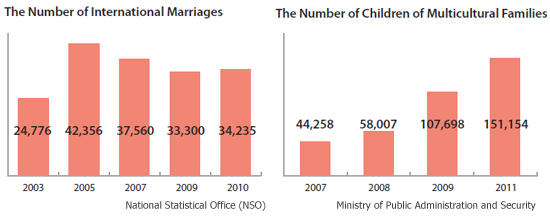
When we discuss multicultural families in Korea, we need to be careful. Except for Taiwan, other countries do not have the term ‘multicultural families.’ In other words, we do not have other countries to compare with Korea to find out whether or not our policies for multicultural families are going the right path. Other countries have polices to help immigrants adapt individually, but they have no interest in whom the immigrant forms a family with, how many children they have or how those children grow. This is because those governments accept immigrants as their citizens from the beginning. There are polices to help the immigrants’ children adapt. However, after they adapt, the government applies the same laws that it apply to its citizens to immigrants’ children. On the contrary, in Korea, the government classifies families composed of our citizen and a foreigner as multicultural families and has a policy that conforms to one’s every life cycle. Also, Korea’s government puts more effort into dealing with international marriage immigrants because they comprise a large proportion of immigrants who settle down here.
Many factors have affected the forming of and the steep increase in multicultural families. In the 1990’s, Korea’s government introduced the ‘Marrying off unmarried men in farming areas campaign.’ This campaign encouraged international marriage for older unmarried men in farming areas. These days, a lopsided gender ratio caused an increase in the number of unmarried men. Also, some Korean females do not feel the need to get married. Due to these circumstances, multicultural families consist mostly of Korean men and foreign women from underdeveloped countries. Of course, there are Korean women who marry foreign men, but the percentage is much lower. When a man and a woman with different cultural backgrounds form a family and live a happy life together, it is not a problem at all. But the problem is that many divorces and maladjustment among multicultural families are taking place.
In 2008, the government strived to legislate for multicultural families aid law. According to Korea Institute for Health and Social Affairs, budget related to aids for multicultural families increased about a hundred times, 12 hundred million won in 2006 and 1162 hundred million won in 2011. At the same time, the number of aid centers for multicultural families increased tenfold, from 21 to 201 centers. Moreover, the childcare fees of multicultural families are 100 percent provided. In spite of these efforts, problems related to multicultural families still exist and its seriousness is deep.
Problems of Multicultural Families
Between Couples
One of the problems that arise in multicultural families is conflict between the husband and wife. There is a matter that comes from an institutional problem. A foreigner spouse has a temporary residence visa (F-2), not a citizenship when he or she marries a Korean citizen and comes to live in Korea. Thus, currently, it is principle that a foreign spouse married to a Korean citizen needs a personal reference from his or her spouse to verify his or her identity. If their spouse withdraws their reference or if he or she disappears, then the foreign spouse has to find a new sponsor in a short period. However, if the foreign spouse has not had much of a social life, it is hard for him or her to get a third sponsor in a short time. Eventually, without their spouse’s reference, when the residence visa or certificate of alien registration expires, they lose their qualification to stay in Korea and must leave the country. The problem with this policy is that if the Korean spouse withdraws the reference after a small fight with his or her spouse, the spouse’s permission to stay in Korea may be cancelled. Because of this, foreign spouses live in constant fear of being sent back.
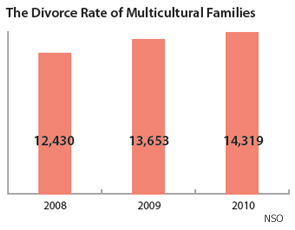
The increasing divorce rate causes social problems. According to NSO, the divorce rate of multicultural families is increasing gradually: 12,430 in 2008, 13,653 in 2009 and 14,319 in 2010. Causes of divorce are diverse, but basically there are culture clashes, language barriers, social prejudices and discrimination caused by differences in values and Korea’s patriarchal culture. Furthermore, since the couples form their family by different needs, naturally conflict arises and lead to divorce. Specifically, if we look at a multicultural family with a Korean man and a foreign woman, the Korean man usually wants a supportive wife, but a foreign woman wants a Korean man who is economically abundant so that she could send money to her family in her home country. This also brings conflict. As the number of international marriages increases, the way in which Koreans treat foreigners has matured, but there is still a tendency to treat Southeast Asian Women contemptuously. Besides, in some houses, family members do not treat foreign spouses with respect and even ignore or discriminate against them by controlling them economically.
The rise in education levels and the consciousness of human rights of immigrant women has also contributed to the increase in the divorce rate. If the foreign spouse proves that their spouse is responsible for the failure of the marriage through trial, then it will be easy for them to gain permission to stay in Korea. There are a few cases in which foreigners use marriage as a means to come into Korea and get citizenship. Foreigners getting married to Koreans with unethical purposes have caused Korean spouses to lose trust in their foreign spouses and result in distrustful marriages. In addition, due to a lack of provided information about their Korean spouse before marriage, foreign women often become disappointed in their spouse after marriage and run away from their home or get divorced. This kind of problem is caused by matchmaking agencies. ‘Second marriage welcome,’ ‘The disabled welcome,’ ‘After sales service’ The matchmaking agencies post these provocative promoting phrases. Since they are only interested in the accomplishment of marriage and not the couple’s actual married life, they usually do not offer specific information about each other.
The average marriage period of couples of multicultural families who got divorced was 4.7 years. This is a very serious matter because it is not only concerned with the couples, but also their children. When the parents get divorced, children have to live with only one parent and go through many more hardships.
Children
Other than the case of parents getting divorced, children in multicultural families are suffering from various problems. As Korea adopts the principle of personal jurisdiction (people with at least one Korean parent are Koreans wherever they are born,) kids in multicultural families which are formed by international marriages are Korean. However, the discrimination against them is serious.
This is a story about a multicultural family that was featured on Yonhap News on January 8, 2012. A boy from a multicultural family, with a father from Bangladesh and a Korean mother, often told his parents that he wanted to commit suicide. Although he was only 11 years old, he often thought about the least painful way of dying. His father said, “I first thought that he could get through these hardships. But after I heard of a middle school student in Daegu who committed suicide because he was bullied at school, I felt my son could get into an urgent situation.” He also mentioned mob violence that happened in the classroom last year in May. On that day, as teachers did not come to the class, students were left without any control. Becoming bored, students in the class voted for the freakiest classmate. All the students except two voted for the boy from a multicultural family. After finishing the vote count, three male students hauled him to the back of the classroom and kicked him for a while. Later, the homeroom teacher came to the classroom and controlled the situation. However, the teacher did not tell the boy’s parents what happened or express his or her regret. After that incident, he could not go to school for four days.
Like this case, kids in multicultural families have trouble adapting to school and making friends because of the psychological isolation they feel from people around them. According to a research conducted by Professor Seol Dong-hun, when he asked the bullies why they picked on kids from multicultural families, 34.1 percent of them answered that it was because they had foreign parents. Some of them answered that ‘they cannot communicate with us smoothly,’ ‘there is no specific reason,’ ‘they behave differently from us,’ and ‘they have a different appearance.’ Put these together, we can see the reasons why kids from multicultural families are bullied are not reasonable or sensible. The problem of them being bullied can be more critical because they cannot discuss possible solutions with their parents since they cannot speak Korean smoothly. If they cannot solve these kinds of problems during their childhood, they may feel frustrated and become confused about their identity. Additionally, some of the kids in the multicultural families cannot speak Korean fluently because they do not use Korean at home when communicating with their parents. This leads to troubles not only in social interaction, but also in learning. To help solve the problems in their lives, supporting them with money, practicing affirmative action and centers for multicultural families are not enough. This is because these can lead to a rather biased perception among Koreans.
Possible Solutions
How can we effectively solve the problems the members of multicultural families suffer from? When it comes to the problems between couples of multicultural families, systems applied to them should be reformed so that they cannot be abused. In addition, the system should reflect the real situation of multicultural families. To solve the problem of increasing divorce in multicultural families, husbands as well as wives should be educated to adapt to unfamiliar cultures. To put it concretely, both of them should understand each other’s cultures and learn each other’s native languages. Also, classes about life in Korea for would-be brides in Vietnam, Mongolia and the Philippines, which are being operated now by Ministry of Gender Equality and Family, need to be expanded. On top of these, unhealthy practices of international matchmaking agencies should be institutionally prevented.
In the case of problems kids from multicultural families suffer from; it seems that we need to fundamentally solve the instability of their family circumstances. Since October 2011, the Jeollabuk-do Office of Education has been supplying education for kids from multicultural families who have trouble communicating in Korean at the kids’ own houses. That is because most of them cannot get extra educational service due to their poor financial conditions. These kinds of support need to be expanded throughout the nation. In addition, guidebooks on the Korean education system should be translated into various languages for parents from multicultural families. Some say that there are not enough multicultural families in Korea to warrant translating official documents into foreign languages. However, all Korean parents including those from multicultural families should be well informed of issues related to their kids’ education in order to enhance their capabilities at school. Therefore, we need more translators. Furthermore, forming networks among multicultural families would be beneficial because they can help each other both physically and emotionally.
Conclusion
Actually, these solutions are not that hard to carry out. There already have been a lot of researches done which are concerned with implementing these solutions. The reason why these problems are not being solved is due to Koreans lack of attention towards multicultural families. This kind of attention comes from cultural tolerance; having interest in things different from us in our society, making an effort to understand others, abandoning the attitude of insisting that we are always right, having respect towards other cultures. Therefore, in order to solve the problem related to multicultural families, cultural tolerance is most needed. We need more effort from every member of our society to create an integrated society. Furthermore, we should not expect members of multicultural families to unconditionally conform everything to Korea’s way.
Currently, Korea is making efforts in all fields to become a country that is acknowledged by all countries around the world. Hosting the 2012 Nuclear Security Summit in Seoul and the 2012 World Expo in Yeosu are some examples of these efforts. Hosting events like these seem to have the purpose of encouraging foreigners to visit Korea. However, like we mentioned before, it seems that Koreans are not yet ready to accept foreigners as equal Korean citizens. The number of multicultural families is expected to increase even more because of our country’s low birth rate and aging society. Instead of striving to become a global country only on the outside, solving multicultural families’ problems and changing our perspectives will be the most appropriate way towards becoming a truly global society.
UOS Student’s Thoughts
According to statistics from the Ministry of Justice immigration and foreigner policy headquarters, in 2010 there were 894,989 foreigners staying in Korea. Here, foreigners staying in Korea include marriage immigrants, foreign workers, foreign exchange students and so on. We wanted to know what these foreigners staying in Korea, specifically what foreign exchange students, thought about the coexistence of diverse cultures in a country and asked them if there is a difference in treatment of foreigners by Koreans. The survey was done by 50 foreign exchange students at UOS. They were from Morocco, France, Turkey, Japan, China, Spain, Germany, the U.S., Sweden, Mexico, New Zealand, South Africa, England, and Malaysia.When asked“What do you think about the coexistence of diverse cultures in your country?” most students gave favorable answers. 28% said ‘Great,’34% answered ‘Very good,’ 26% said ‘Good.’ Students, who answered ‘Bad’ and ‘Very bad,’ were 2% and 6%, respectively.
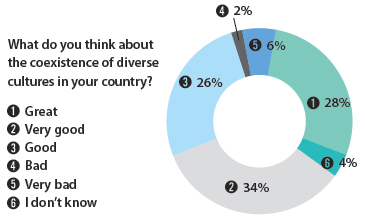
We asked them “Do you consider Korea to be a multicultural country”, 44% of foreign exchange students said ‘Yes,’ 30% said ‘No,’ and 26% answered ‘I don’t know.’ When they were asked “Is there discrimination against foreigners in Korea?”, 42% said ‘Yes,’ 36% said ‘No’ and the rest said ‘I don’t know.’ We asked those who answered ‘Yes,' for examples of what kind of discrimination foreigners experience and most foreign students said that Koreans were favorable to foreigners from U.S.A or from countries that speak English and ignore foreigners from Asian countries. In addition, they added that Koreans had a tendency to discriminate against foreigners from certain countries, rather than all foreigners. Lastly, when we asked “Is there any discrimination against foreigners at our university?”, 26% said ‘Yes’ and 74% said ‘No.’ We had hoped that there wasn’t any discrimination at our university, so we were kind of disappointed. We will mention some examples in which foreign exchange students were discriminated against. UOS students excluded students from China while doing team projects and tend to give special treatment to American students and treat Chinese Foreign exchange students poorly.
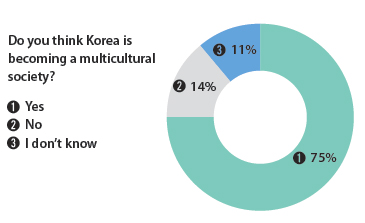
We also wanted to know what Korean students at UOS think about foreigners in Korea. When we asked them “Do you think Korea is becoming a multicultural society?” 75% of them said yes. 14% of them said no, and the other 11% said they do not know. We asked “Do you think multicultural education is necessary these days?” 95% of them said yes, and 5% said no. Based on this question, we found out that most UOS Korean students feel that Koreans need to prepare for becoming multicultural. In addition, when we asked “Do you think it as a good thing that various races, religions and cultures coexist in your country?”, 16 percent of them answered “very good,” 31% said “good,” 41% said “I do not care,” 11 percent said “bad” and 1 percent of them answered it to be very bad. That is, 47 percent of UOS Korean students think positively about living with people who have diverse values in our country. We also wanted to know what students thought of the discrimination foreigners in Korea suffered.
To the question, “Do you think there is discrimination against foreigners in Korea?” 88% said yes, and 12 of them said no. Most of the students who said yes to the question thought Koreans treat foreigners differently according to where they were from. For example, Koreans are favorable towards people from western countries and white people, while they are not so favorable towards those from East Asia and black people. Lastly, we asked “Have you ever seen foreign students in UOS being discriminated against?” 73% of the students said yes. What they saw was mainly related to Chinese exchange students and took place in the class or during team projects.

